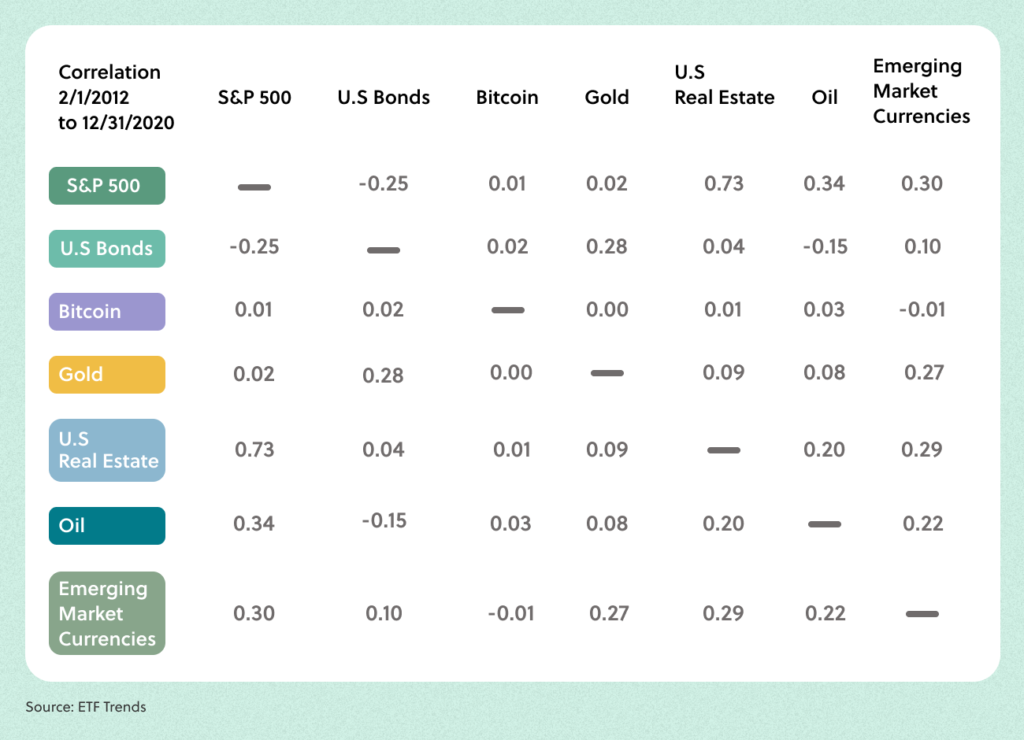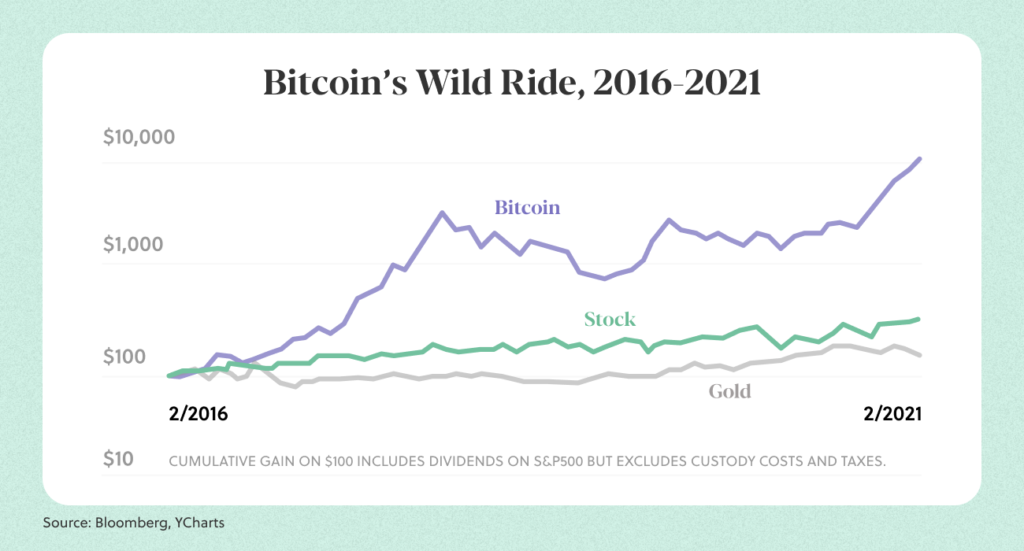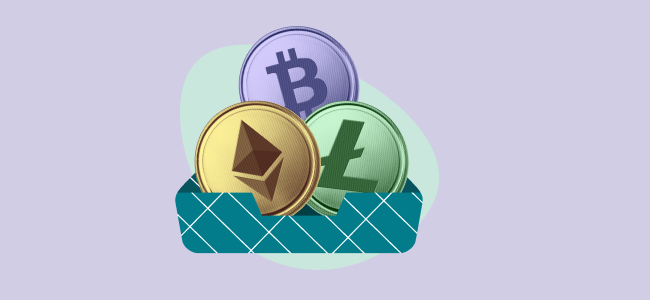While bitcoin has been around for 13 years, asking the question “Is bitcoin a good investment” still remains as polarising as ever.
While many bitcoin enthusiasts have talked about its usefulness as a store of value and an inflation hedge (that is, “the While many bitcoin enthusiasts have talked about its usefulness as a store of value and an inflation hedge (that is, as “the digital gold”), it is an asset that remains subject to high volatility and regulatory risk, among other risks.
Given this situation, is bitcoin a good investment? If you’re neither here nor there like many others and left wondering whether you should invest in bitcoin or not, this is the right place to be.
In this article, we will consider the arguments surrounding the value of bitcoin and whether it’s a good investment at the present stage, as well as into the near future.
We’ll look at:
- What is bitcoin?
- Bitcoin as store of value and digital gold
- Is bitcoin a good investment? The pros
- Is bitcoin a good investment? The cons
- What does the future hold for bitcoin?
- How to buy bitcoin in the UAE
At the end, you will be able to decide for yourself whether to invest in bitcoin or not.
1. What is bitcoin?
Bitcoin is a digital currency that was created in 2009 to solve the problems associated with fiat money (dollars, pounds, dirham, etc.).
In the wake of the 2009 financial crisis, fiat money was criticised for its centralisation, in which the government controls money supply and can manoeuvre it at will. Also, some critics began to see the exchange of fiat money as too fraught with regulations.
By employing blockchain technology, bitcoin introduced a decentralised exchange system devoid of government control and regulations. This concept on its own can polarise a room full of investors, since a decentralised exchange system can leave room for fraudulent and illegal transactions. However, some argue that with bitcoin, users can enjoy anonymity, hindrances to global exchange of money are removed, and the value of money is left to free market forces rather than the intervention of central governments.
After coming to the market in 2009, bitcoin has grown tremendously, crossing $1 trillion in market capitalisation on February 19, 2021, a feat that has only been achieved by five companies to date (Amazon, Apple, Microsoft, Alphabet, Tesla).
[For better understanding of bitcoin in particular and cryptocurrencies in general, read, “What is Cryptocurrency? A Beginner’s Complete Guide”]
2. Bitcoin as store of value and digital gold
Bitcoin as store of value
Though bitcoin came to the market as an alternative currency (a digital currency), it has become an investment asset. However, this development arose from bitcoin’s intrinsic value: its limited supply makes it a good store of value.
Now, let’s spend some time unpacking the above.
Remember that one of the challenges of fiat money is that the government can increase money supply at will. The effect of this is that the higher the supply of money relative to its demand, the lower the value of money. In essence, the value of money decreases as its supply increases relative to its demand. This reduction in the value of money due to rising money supply is also known as inflation.
How does this affect you? Simply put, what cost you $1,000 to purchase 10 years ago will now cost you more. Said differently, you will now purchase less items with the same $1,000.
In contrast, bitcoin has a fixed maximum supply of 21 million BTC. No government can “print” more bitcoin, leading to a reduction in its value. Hence, you can be confident that its value will not erode due to a rising money supply.
Bitcoin as digital gold
Because bitcoin is a good store of value, analysts and investors have compared it to gold, dubbing it the digital gold.
Gold has derived its core investment value from its use as a hedge against inflation. Since it’s difficult to increase the supply of gold, unlike fiat money which is simply the printing of a bunch of government-backed paper, it’s a good store of value.
Analysts and investors now trust that bitcoin as a store of value will also provide the hedge against inflation that gold has provided.
However, the inflation rate has been relatively stable in the past few years and bitcoin’s value as a digital gold is still anticipatory rather than evidential. “While Bitcoin may not be a safe-haven asset yet, it has the potential to become one,” according to The Economic Times, “since it is expected to increase in value and retain it during times of economic turbulence owing to its uncorrelated status.”
[To learn more about bitcoin’s value as a digital gold, read, “Why Invest in Bitcoin? Understanding The Value of ‘Digital Gold’”]
3. Is bitcoin a good investment? The pros
So, what arguments have been made for the value of bitcoin as a good investment?
A good way to diversify your portfolio
Diversification is the process of spreading your risk, refusing to put all your eggs in one basket. Harry Markowitz popularised the importance of portfolio diversification when he introduced the Modern Portfolio Theory in 1952.
Harry discovered that when you combine uncorrelated assets (that is, assets that don’t move in the same direction) in a portfolio, the risk of the portfolio is lower than when you have a single asset or many correlated assets.
When two assets are uncorrelated, a fall in one does not lead to a fall in the other. Therefore, when one is falling, the other can retain its value (zero correlation) or even rise (negative correlation).
It was for this reason that gold became an important part of many investors’ portfolios. Between 2012 and 2020, the gold market had a 0.02 (almost zero) correlation to the stock market, according to data from Morning Star.

Due to its gold-like status, bitcoin also showed almost-zero correlation to the stock market during the same period (0.01), making it an important diversification tool.
However, the correlation coefficient between bitcoin and the stock market increased significantly in 2021.
In October, 2021, The Guardian reported a 0.20 coefficient while Coin Telegraph, a popular cryptocurrency news website, reported a 0.33 correlation in December. The presence of meme stocks (like GameStop and AMC) and the increasing entrance of institutional investors into the bitcoin market may further increase this correlation and put the diversification benefit of bitcoin to a greater test.
[To learn more about the benefits of diversification, read, “Learning The Importance of Portfolio Diversification Can Prevent Huge Loss. Here’s Why.”]
A good way to earn outsized returns
Like many people, you probably came to know about bitcoin due to the outsized returns that investors made on it.

The chart above shows how bitcoin outperformed the gold and stock market between February, 2016 and February, 2021. For the year 2021, bitcoin grew by 70% while the stock market grew by 28% and gold fell by 7%.
This ability to return enormous profit for investors, compared to stocks and gold, has been one of its strongest appeals. It has been largely driven by the excitement of being part of a fast upturn in prices.
Many investors have joined during the past few years for this reason. Psychologists call it the fear of missing out (FOMO), and it creates the kind of market exuberance that has made bitcoin a household name.
The benefit of high liquidity
While different investors have different reasons for buying and selling bitcoin, the combined effect is that bitcoin is highly liquid.
At the time of writing, $19 billion worth of bitcoin were transacted in the last 24 hours. For comparison, only $3.7 billion worth of Ford’s stock (the most liquid stock during time of writing) was transacted within the same period.
What is the benefit of this high liquidity?
When a market is liquid, you can quickly create and execute buy and sell orders. The longer the time between when you create an order and when it is executed, the higher the risk that you will get less for your sell orders (price has fallen) or pay more for your buy orders (price has risen), and vice versa.
High liquidity also means you can quickly turn your asset to cash when you are in dire need or you anticipate a market crash.
Potential inflation hedge
As discussed above, bitcoin is expected to provide the same protection gold provides during high inflation periods. For now, this remains to be seen.
4. Is bitcoin a good investment? The cons
Is bitcoin a good investment? Having looked at the positive answers to that question, let’s consider some of the negatives that have resulted in caution among analysts and investors.
High volatility
Though bitcoin cannot be artificially devalued by the government, market speculation often swings its price here and there, making it highly volatile. While high volatility is good news on the upside, it’s bad news on the downside.
For example, though bitcoin peaked at $66,971.83 on November 9, 2021, it fell to $51,462.05 on December 27 and it is now trading at $42,778.44 at the time of writing. Consequently, while you can make millions in bitcoin, you can also lose millions.
However, high volatility poses less problems for long-term investors since the longer you stay in the market, the lesser the risk of losing your money. Also, as bitcoin stays longer in the market, it will find its true value and price volatility may reduce.
“Bitcoin has only been around for a short time—it is still in the price discovery phase,” writes Investopedia, a financial news and education website. “This means that prices will continue to change as investors, users, and governments work through the initial growing pains and concerns until prices stabilise—if a stable point can be reached.”
Regulation challenges
In 2021, we saw China clamp down on cryptocurrency and cryptocurrency companies.
They closed many crypto mining operations and prevented major banks from doing business with crypto companies before making all cryptocurrency transactions illegal. Binance, the leading crypto exchange in the world, was also banned from carrying out certain regulated actions in the UK.
Janet Yallen, secretary of the US Treasury, also raised the alarm about the use of bitcoin to facilitate illicit transactions, calling for greater compliance. The 2021 US Infrastructure Bill also contains some crypto tax regulations that may remove some of the anonymity benefits of bitcoin and other cryptocurrencies.
Investopedia has concluded that “bitcoin has a regulation problem,” while UBS, a global financial firm, believes that “shifting investor sentiment or regulatory crackdowns could pop bubble-like crypto markets.”
Environmental impact
The impact of bitcoin mining on the environment is another concern. Mining bitcoin requires the use of high energy-consuming devices.
As the price, market cap, and trading volume of bitcoin has surged, worries about its carbon footprint have emerged. Estimates in early 2021 show that bitcoin consumed as much electricity as Chile and more electricity than the Netherlands. Elon Musk and Janet Yallen have also expressed similar concerns.
It remains to be seen how these concerns will affect regulations in the future.
However, since bitcoin is already at 90% of its maximum supply, this challenge might not be significant in the long term.
Insecurity
Cases of cyber hacks show the risk of a decentralised currency like bitcoin. If you trade bitcoin often, you will need a hot wallet and they are more susceptible to hacks. Though cold wallets are safer, you cannot trade with them.
However, buying bitcoin on credible exchanges or through a bitcoin trust like Grayscale Bitcoin Trust (GBTC) can reduce your security risk to the barest minimum.
[To learn more about the advantages of GBTC and why we use it at Sarwa, read, “How to Buy Bitcoin in the UAE: Rules For Diversifying Into Crypto”].
5. What does the future hold for bitcoin?
So, where do we go from here?
Well, it depends on who you ask. Some enthusiasts are so confident in bitcoin that they expect it to reach $100,000 in the future. On the other hand, many analysts are worried about the uncertainty of regulations, especially with what happened in China in 2021.
“We can speculate on what value cryptocurrency may have for investors in the coming months and years (and many will),” said Ryan Haar, a writer for Time, the popular magazine, “but the reality is it’s still a new and speculative investment, without much history on which to base predictions.”
Therefore, she has stood in agreement with other financial advisors, including Sarwa, who have advised that you limit your investment in bitcoin (if you are willing to invest in it to begin with) in your portfolio.
Its diversification benefits, outsized returns, high liquidity, and inflation hedge are the good things going for it, but given its cons, 5% seems a reasonable limit until we see how the future unfolds for bitcoin.
[To learn about the do’s and don’t’s of bitcoin trading, read, “Bitcoin Trading Advice: The Do’s and Don’ts of Trading Bitcoin“].
6. How to buy bitcoin in the UAE
It’s best to buy bitcoin as part of your overall investment portfolio rather than as a single asset. Remember that a diversified portfolio will minimise your risk.
With both Sarwa Invest and Sarwa Trade, we provide you either with a diversified portfolio that includes stock ETFs, bond ETFs, REITs ETFs, and a 5% allocation to bitcoin, or you can choose to buy bitcoin yourself through our self-directed trading product.
For our Invest portfolios, we purchase bitcoin through GBTC which means less fees, less risk, more security, high liquidity, and an opportunity to earn a premium.
Through Sarwa Invest, you can get exposure to the benefits of bitcoin while protecting your money from some of its risks.
Takeaways
- Bitcoin was launched as a digital currency but because of its limited supply, and some analysts argue that it has become a good store of value
- Due to its gold-like attributes, some analysts have touted bitcoin as the digital gold
- Some of the benefits of bitcoin that makes it a good investment include diversification, outsized returns, high liquidity, and potential inflation hedge.
- Some of the cons of bitcoin that makes it suspect as a good investment include high volatility, regulation challenges, environmental impact, and insecurity.
- To enjoy its benefits and minimise exposure to its risk, it’s better to invest in bitcoin as part of a portfolio with a maximum of 5% allocation.
